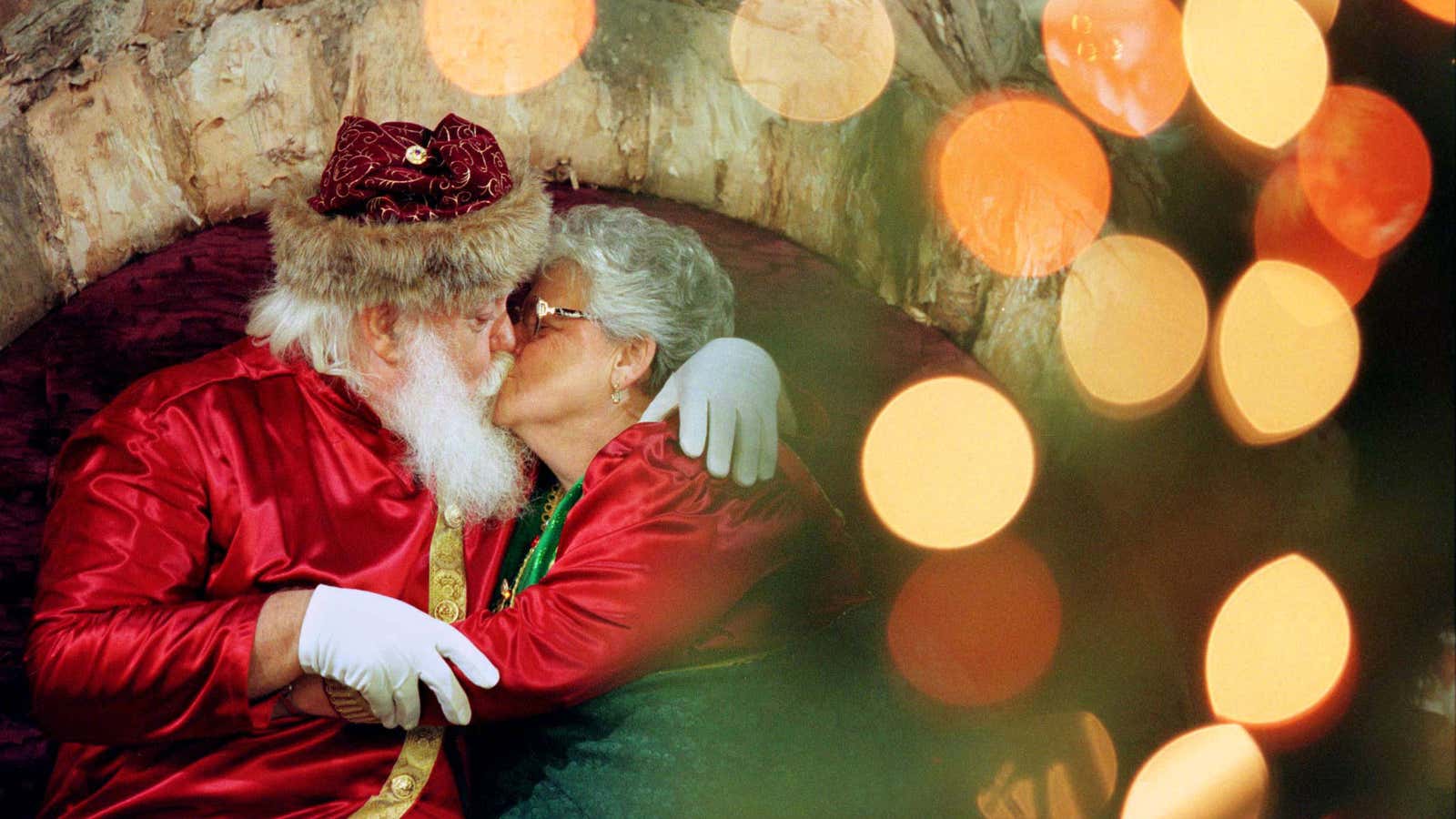I do not like relationship books. But I wrote one.
I wanted to understand why we act the way we do around the people we choose to spend the rest of our lives with. Why do we fight so much? I didn’t like the touchy-feely approach of many relationship books, the ones that required I gaze into my husband’s eyes and use a lot of “I” statements, such as “I am mad as hell that I have to do all the Christmas shopping.” So with co-author Paula Szuchman, I set out to do something different.
As part of my research, I read Gary Chapman’s Five Love Languages, perhaps the cheesiest, most touch-y feel-y looking relationship book ever published (blazing sunset, partners walking hand in hand on beach, curly cue writing).
And it blew me away.
In five bullet points and a few pages, it explained virtually every argument I had ever had with my spouse, including the one we had at Christmas every single year. With the stress-laden, alcohol-drenched holidays upon us, I thought I’d share his pearls of wisdom in the hopes that you too can avoid fighting your way through the festive season, and, maybe even reduce your bickering permanently.
Chapman’s theory is simple. He thinks that each of us speaks one of five primary love languages (here’s the test so you can see for yourself):
- Acts of Service: “For these people, actions speak louder than words.”
- Words of Affirmation: “This language uses words to affirm other people.”
- Receiving Gifts: “For some people, what makes them feel most loved is to receive a gift.”
- Physical Touch: “To this person, nothing speaks more deeply than appropriate touch.”
- Quality Time: “This language is all about giving the other person your undivided attention.”
The language we speak is the way we express love, and probably, the way we want love expressed to us. But more often than not, we married someone different than us, and they speak a different language.
Chapman told one Nashville audience: “Adults all have a love tank. If you feel loved by your spouse, the whole world is right. If the love tank is empty, the whole world can begin to look dark.”
But as author Bruce Feiler pointed out in the New York Times, we fill that tank in different ways.
With best intentions, we tend to express our love language to our partner, and then end up shocked, frustrated and consistently disappointed when they 1) don’t think it’s amazing and 2) don’t replicate it. But it’s because they speak another language.
For example, my husband is a physical touch kinda guy. He likes hugs. My friends know him as an epic hugger. So he hugs me a lot, which is nice.
But I am an acts of service kinda gal. The way to my heart is to do things, ideally without having to be asked. Hugs are great, but pick up my dry cleaning, plan a holiday and change the damn LED lights, and voila, you complete me.
Naturally, I think doing acts of service are the ultimate expression of love. But while I am busy baking banana bread and doing his laundry, he just wants hugs.
Chapman acknowledges that we speak more than one language. And we all need some of all of these things for our relationships to succeed. But his point is that we have a primary language and figuring that out will help us meet the needs of our partners, which will help refill those love tanks (cheese alarm!).
Before you scoff at the tank analogy, consider this: When our tanks are “full,” we forgive our partner’s foibles. Late from work? He’s working hard; The dorky sweater he gave me? What a nice effort. But when your tank is empty, every slight feels like a crime against humanity: Late from work? He doesn’t prioritize family. The sweater? Have you ever met me?
Chapman offers important nuances for each “language.” Gifts, for example, don’t have to be Prada handbags. They can be flowers from the garden, or a sweet note on a piece of A4, stuffed in his jacket pocket. Words of affirmation should be specific: saying “you are awesome” will quickly become meaningless, but “it is so awesome that you are working out again,” will work wonders for the words-of-affirmation person. Quality time means putting your phone away. And physical touch? “It’s not all about the bedroom.”
In an age of science, and pseudo-science, Chapman’s book is refreshingly unscientific and non-academic. Chapman is a Southern Baptist pastor who started offering marriage counseling in Winston-Salem, North Carolina more than 50 years ago. He eventually saw some patterns, wrote them down and sold more than 7 million books.
I like science. Our book used behavioral economics to solve common conflicts in marriage which required researching relationships, and behavioral economics, as well as interviewing hundreds of people. I learned a lot about why marriage can be maddening, why couples fight and how to think about improving our behavior.
But I often come back to Chapman’s gloriously simple and staggeringly accurate love languages.
Now if I can just up the number of hugs I give this holiday season, it will indeed be a very merry season.
